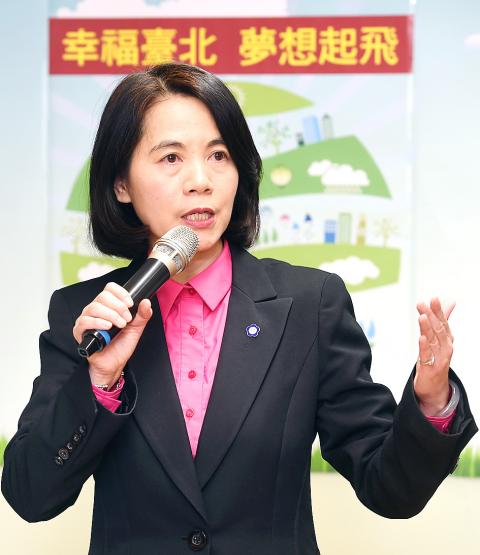National Chenchi University professor Chou Li-fang (周麗芳) yesterday was appointed Taipei’s third deputy mayor, following a two-month search.
Taipei Mayor Ko Wen-je (柯文哲) praised Chou’s academic and administrative experience, expressing his confidence in her ability to shoulder responsibility for departments including education, labor, sports and cultural affairs, as well as events such as the 2016 World Design Capital and 2017 Universiade.
In addition to her academic career, Chou has served as director of the university’s Office of Research and Development and deputy chief executive of the National Health Insurance Administration.

Photo: Liao Chen-huei, Taipei Times
While Ko’s first two deputy mayors were appointed in December last year, his search for a third has been held up for almost two months after he was unable to find a willing candidate with strong corporate executive experience, something he earlier attributed to the low pay offered by the municipal government.
“Teachers do not make very much in the first place,” he said yesterday in response to question on whether Chou’s salary had been a sticking point.
Taipei spokesman Sidney Lin (林鶴明) said that Chou was chosen from among 56 valid candidates who applied online in response to a Facebook post by Ko.
“I am someone who is willing to face challenges,” Chou said when asked why she accepted the position, adding that she was drawn to the position because of her desire to outline a cultural vision for the capital’s future.
On coordinating the 2017 Universiade, Chou said she would emphasize frugality and honing the event’s message.
“We hope to economize as much as possible, while still maximizing the benefits of the event,” she said.
“When the competitors come to Taiwan, aside from the competition itself, we hope they will serve as bees that carry back a rich pollen of memories to their home countries, aiding our diplomacy,” she said.
Chou is viewed as pan-blue due to her title of “special researcher” to the National Policy Foundation, a think tank associated with the Chinese Nationalist Party (KMT).

Several Chinese Nationalist Party (KMT) officials including Chairman Eric Chu (朱立倫) are to be summoned for questioning and then transferred to prosecutors for holding an illegal assembly in Taipei last night, the Taipei Police said today. Chu and two others hosted an illegal assembly and are to be requested to explain their actions, the Taipei City Police Department's Zhongzheng (中正) First Precinct said, referring to a protest held after Huang Lu Chin-ju (黃呂錦茹), KMT Taipei's chapter director, and several other KMT staffers were questioned for alleged signature forgery in recall petitions against Democratic Progressive Party (DPP) legislators. Taipei prosecutors had filed

Taiwan would welcome the return of Honduras as a diplomatic ally if its next president decides to make such a move, Minister of Foreign Affairs Lin Chia-lung (林佳龍) said yesterday. “Of course, we would welcome Honduras if they want to restore diplomatic ties with Taiwan after their elections,” Lin said at a meeting of the legislature’s Foreign Affairs and National Defense Committee, when asked to comment on statements made by two of the three Honduran presidential candidates during the presidential campaign in the Central American country. Taiwan is paying close attention to the region as a whole in the wake of a

NEW WORLD: Taiwan is pursuing innovative approaches to international relations through economics, trade and values-based diplomacy, the foreign minister said Taiwan would implement a “three-chain strategy” that promotes democratic values in response to US tariffs, Minister of Foreign Affairs Lin Chia-lung (林佳龍) said. Taiwan would aim to create a “global democratic value chain,” seek to capitalize on its position within the first island chain and promote a “non-red supply chain,” Lin was quoted as saying in the ministry’s written report to the Legislative Yuan submitted ahead of the legislature’s Foreign Affairs and National Defense Committee meeting slated for today. The Ministry would also uphold a spirit of mutual beneficial collaboration, maintaining close communication and consultations with Washington to show that Taiwan-US cooperation

Taiwan and the US have begun trade negotiations over tariffs imposed by US President Donald Trump earlier this month, Minister of Foreign Affairs Lin Chia-lung (林佳龍) said in an interview this morning before reporting to the Legislative Yuan’s Foreign Affairs and National Defense Committee. The Taipei Economic and Cultural Representative Office (TECRO), Taiwan’s de facto embassy in the US, has already established communication channels with the US Department of State and the US Trade Representative (USTR), and is engaging in intensive consultations, he said. Points of negotiation include tariffs, non-tariff trade barriers and issues related to investment, procurement and export controls, he